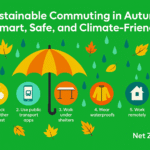Our world is changing fast. With climate change accelerating and environmental challenges affecting us all, shifting to a net zero economy is no longer a lofty goal. It’s a necessity for our future. This transition to a cleaner, balanced system of energy and resources isn’t just about saving the planet; it’s also opening new opportunities for jobs and careers that mean something to us as individuals. In this post, we’ll explore what a net zero economy is, why it’s important, and how it’s inspiring both established and emerging roles in green industries that could shape your career for years to come.
What is Net Zero Economy?
Simply put, a net zero economy is one where we balance out the greenhouse gases we emit with the amount we remove from the atmosphere. Imagine taking a step back from the existing habits of burning fossil fuels and wasteful resource use and instead creating systems that replace harmful emissions with renewable energy and innovative solutions like reforestation and carbon capture. This isn’t just a technical challenge but about rethinking everything from the way our industries operate to how our cities are designed, ensuring that economic growth goes hand in hand with environmental care.
Why Transitioning Matters
We often hear that the planet is in peril, and for good reason. Scientists agree that to avoid the worst effects of climate change, we must act quickly to bring down emissions. Moving away from fossil fuels and toward green energy isn’t only about protecting the environment; it’s also about building stronger, more resilient economies. When we invest in clean power, sustainable agriculture, and green technology, we invest in our future. In a net zero economy, success isn’t measured merely by financial gains but by the well-being of communities and the environment alike.
Today’s Green Job Roles
One of the most exciting parts of the net zero transition is the rise of green jobs. These new and evolving careers are reshaping industries and opening the door for many who want a career that makes a difference.
Take renewable energy professionals, for instance. From the experts installing solar panels to wind turbine engineers who fine-tune efficiency, these roles are at the forefront of powering our world with clean energy. Their work isn’t just about energy production. It’s about reducing reliance on fossil fuels, lowering emissions, and keeping our communities thriving.
Similarly, in the world of sustainable construction, architects and energy auditors are reimagining how we build and maintain our homes and workplaces. Concepts like using eco-friendly materials and smart energy-saving techniques are no longer optional; they’re becoming industry standards. Professionals in this field often work on achieving certifications like LEED (Leadership in Energy and Environmental Design), which not only shows a commitment to sustainability but also helps create healthier, more efficient buildings for everyone.
Energy efficiency experts are similarly paving the way toward a net zero future. Their work might involve retrofitting older buildings to cut down energy waste or finding innovative ways to save energy in new projects. These efforts make a real difference by reducing our overall carbon footprint, lowering costs for businesses and households, and helping our cities become more sustainable.
In addition, the transportation sector, a significant source of global emissions is undergoing a dramatic transformation. Urban planners are redesigning cities with better public transit options, while electrical engineers and software developers focus on creating smarter, more efficient systems for electric vehicles and public transport networks. These changes are not only improving the way we get around but also contributing to a major reduction in pollution and congestion, making our urban environments cleaner and more livable.
Emerging Green Roles: The Future is Already Here
While many of today’s green jobs are making an immediate impact, a wave of new and innovative roles is already emerging as the net zero economy evolves. One of these is sustainability consulting. As more companies integrate environmental, social, and governance (ESG) principles into their everyday operations, businesses need experts who can blend profit and planet. Sustainability consultants work directly with companies to help them develop strategies that balance economic growth with a low-impact, environmentally friendly approach.
Another booming area is environmental data analysis. In our increasingly data-driven world, professionals who can use cutting-edge analytics and artificial intelligence to track everything from energy consumption to carbon output are in high demand. These experts help decision-makers understand the impact of their policies and investments, ensuring that action toward sustainability is as effective as possible. By turning numbers into actionable insights, environmental data analysts play a crucial role in shaping policy and driving green innovation.
The growing focus on the circular economy has also led to new positions. Instead of the old “take-make-dispose” way of operating, we’re now looking at systems where waste is minimized, and materials are continuously reused and recycled. This shift has given rise to roles like product designers committed to sustainability and lifecycle analysts who map out exactly how everything we produce and consume can be reimagined as a resource rather than waste.
Finance, too, is changing. Green finance specialists and sustainable investment professionals are crafting innovative financial tools, such as green bonds and sustainability-linked loans, that support renewable projects and eco-friendly initiatives. Roles like “Carbon Market Analyst,” which focus on understanding and managing carbon credits, are becoming crucial as the market for sustainable investments grows more robust. This blend of finance and environmental focus ensures that the money flowing into businesses and projects is also fueling the fight against climate change.
Integrating a Green Career into Your Life
Choosing a career in the green sector isn’t just about finding a job. It involves aligning what you do with what you care about. As more and more people realize that work can be a powerful force for positive change, the dream of pursuing a career that both inspires and sustains becomes all the more achievable.
Starting such a career typically begins with education. Many universities and online platforms now offer courses and certifications in renewable energy, sustainable business practices, environmental science, and more. This specialized training gives you both the technical skills you need and a solid grasp of the issues that matter in our changing world.
Networking is another key piece of the puzzle. Whether you attend conferences or join online communities, connecting with professionals who share your passion for sustainability can open up doors and provide invaluable support. Mentorships, in particular, can help guide you through transitions whether you’re switching fields or just starting out.
Hands-on experience can make a huge difference as well. Volunteering with local environmental groups, interning at renewable energy companies, or participating in community sustainability projects are all excellent ways to build your resume while demonstrating your commitment to making a change. These experiences are often the stepping stones to a more focused and specialized role within the green sector.
It’s also worth mentioning that soft skills like teamwork, communication, and problem-solving are essential in sustainability. Whether you’re explaining complex ideas in a clear way or managing a diverse team of experts, these skills help ensure that innovations in green technology and policy don’t just stay on paper but make a real-world impact.
The Big Picture: Policy, Culture, and Corporate Shifts
The move toward a net zero economy is fueled by more than just technology. it’s a cultural and political revolution too. Around the globe, governments are setting ambitious climate targets and launching initiatives that support renewable energy development and sustainable practices. These policies, combined with incentives such as tax breaks and subsidies, are critical in making green jobs and technologies not only attractive but also accessible.
At the same time, major companies are increasingly integrating sustainability into their core business strategies. Whether through partnerships with startups, investments in green technology, or comprehensive sustainability projects, the business community is beginning to understand that profitability and planetary care are not mutually exclusive. This corporate shift is creating a wealth of opportunities in every sector from finance and technology to construction and transportation.
On a more local and personal level, the shift is also already visible in communities. People are choosing eco-friendly lifestyles by embracing practices like urban gardening, zero-waste living, and energy conservation at home. These community-led initiatives help create a cultural environment where sustainability is not just admired but actively practiced ensuring that the net zero vision goes far beyond policy or market shifts to become a part of our everyday lives.
Charting Your Own Green Future
If you’re considering a change or just starting out, the net zero economy offers a clear roadmap for a fulfilling career. Begin by educating yourself through courses and certifications. Stay informed by reading up on the latest in renewable technology, environmental policies, and green finance. Don’t underestimate the power of networking. Step out and connect with others who share your interest, learn from experts, and be open to opportunities that might lead you into unexpected but rewarding fields.
The best part about green careers is that they allow you to turn your passion into purpose. Every day, professionals across industries play a direct role in reducing emissions, designing innovative technologies, and creating sustainable communities. Whether you’re working on a breakthrough in smart energy systems or redesigning everyday products to be more sustainable, you’re contributing to a movement that has the potential to change the world.
A career in sustainability is a journey marked by continuous learning and growth. By embracing new challenges, developing both technical and interpersonal skills, and staying committed to a cause larger than yourself, you can build a professional life that not only pays the bills but also leaves a lasting impact. It’s a choice to live with the knowledge that every action, big or small, propels us closer to a future where economic vitality and environmental health go hand in hand.
Final Thoughts
The net zero economy isn’t just a theoretical concept. it’s becoming our reality. As we shift away from old, unsustainable practices and forge paths that balance economic growth with the health of our planet, green jobs and sustainable careers are emerging as some of the most promising and meaningful opportunities of our time.
Whether you’re drawn to renewable energy, sustainable construction, environmental policy, or any role that helps pave the way for a greener future, remember that your work matters. In a world where every decision impacts our health and our home, choosing a career in sustainability is choosing a life filled with purpose, creativity, and hope.
The journey toward a net zero economy is a shared one. Each step towards every innovative idea, every eco-friendly project, and every change in policy brings us closer to a future where our communities thrive in harmony with nature. If you’re ready to be a part of that future, now is the time to learn, act, and inspire. Your career can be the change that our world desperately needs.










